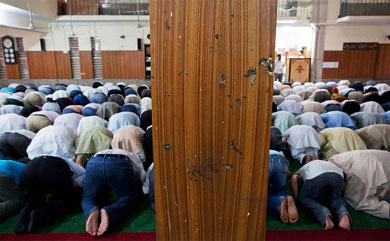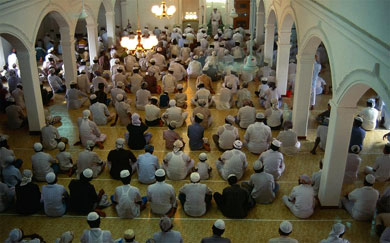
By Zehra Abid
January 27, 2015

Bullet holes are seen at the Garhi Shahu mosque, where members of the persecuted Ahmadiyya community pray during Friday prayers, on July 16, 2010 in Lahore, Pakistan. The mosque was attacked that May.Daniel Berehulak / Getty Images
Pakistan’s story began with a parting — partition from India — and now, for a growing number of people, it is ending with another parting. Negombo, a beach town 24 miles from Sri Lanka’s capital, Colombo, is refuge for hundreds of Ahmadi Muslims fleeing persecution in Pakistan.
According to the Colombo office of the UN Refugee Agency, or UNHCR, there was a nearly 780 percent increase in the number of Pakistani asylum seekers in Sri Lanka from 2012, when 152 people sought asylum, to 2013, when this number jumped to 1,338. While most of them are Ahmadis, the number also includes Pakistani Christians and Shia Muslims, who have also faced increasing persecution in Pakistan over the years.
However, with Sri Lanka becoming less accessible following the suspension last year of on-arrival visa facilities, fewer people have sought shelter here recently. In 2014, only 239 new asylum seekers were registered.
Members of the Ahmadiyya community can be found all over the world. In Pakistan, their population ranges from 600,000 to 700,000, according to Ahmadi leaders in that country (there has been no census there since 1998). They are among a growing number of minorities — people belonging to small sects within Islam and non-Muslims — leaving Pakistan against the backdrop of increasing religious intolerance and attacks on marginal groups in recent years.
In the lottery of birth, Negombo’s newest residents have been terrible losers. There is a law against Ahmadis practicing their religion in Pakistan, where they were declared non-Muslims under a constitutional amendment more than 40 years ago, following months of rioting. Decades later, the legislation has divided both homes and families and sent many into exile. The worst incident in recent times occurred in May 2010 in Lahore when two Ahmadi mosques were attacked, resulting in the deaths of nearly 100 people.
“Ahmadis have a good case for asylum because there is legalized, state-sanctioned persecution against them in Pakistan,” says Asad Jamal, a human-rights lawyer in Pakistan. “There is both formal and informal discrimination against the group, from criminal cases being instituted against Ahmadis for practicing their belief system, being informally barred against being given jobs in state institutions, to their graveyards being desecrated … Students, too, are forced to hide their identity. How can people live in such a situation?”
The Ahmadi mosque in Negombo is a cradle for those seeking asylum. There is a mix of ages, backgrounds and incomes here, but the asylum seekers are united by their loss. Almost everyone has lost a family member, a friend, an acquaintance. Some have lost their homes to looting or arson. At the mosque, they come to socialize, take the free classes that are offered and worship with a freedom that they did not have in Pakistan.
Amna's Story
Twenty-four-year-old Amna comes here too. Amna, whose name has been changed because of death threats she has received, fled Pakistan two years ago after facing allegations of blasphemy in her final semester of college. Immediately after, she was expelled. Amna would have graduated in 2012, but all she has to show for her efforts now is a 3.27 GPA.
Her academic life came to an abrupt end when she found hate literature attacking Ahmadis posted outside her hostel door. Posters criticizing the religious sect had been placed all over her school’s campus for months, and she was tired of seeing them, she says, so she tore up the ones outside the hostel door. A hostel guard saw her and claimed she had torn up Quranic verses and Prophet Muhammad’s sayings (also known as the Hadith). He accused her of blasphemy, a serious charge that can result in a death penalty in Pakistan. Amna challenged his account, but nobody listened to her, she says. Soon, posters began showing up around campus insisting that she be expelled, and on the college’s Facebook page, students demanded that she be killed. The posts, which have since been removed, called for shooting her immediately and criticized other students for having been “too late” in dealing with the incident.
“The entire hostel was standing outside my room and calling me an infidel,” Amna says. “The administration said they would collect all the girls in the common room and told me to apologize, but I said I haven’t done anything wrong. They were all coming after me, the college gates were shut, I couldn’t leave. Then a hostel warden helped me escape from the rear gate.” The student was in hiding for weeks, with help from Ahmadi leaders, before moving back to her home in Rabwah, the religious headquarters of the community in Pakistan.
“I was the only Ahmadi in my class and people would keep saying things about Ahmadis being non-Muslims. I was tired of it.” Amna is visibly angry, her eyes fierce. “I only had one semester left. I asked my teachers whether I could take the exams from home, but they would not even let me do that.”
Amna says that she continued to receive threats in Rabwah and couldn’t step out of her house for fear of being attacked. “It was very suffocating living like that,” she says. Community leaders tried to get her college to give her a waiver so she could complete her degree, but nobody was willing to accept her application. Finally, feeling like she was out of options, she moved to Sri Lanka in January 2013 as a first step toward seeking asylum.
For four months, Amna lived alone in a room at the mosque before her parents could gather the financial resources to join her. After her daughter left, Amna’s mother sold the chicken tikka shop the family owned, packed up whatever she could carry with her and went to Negombo with her husband, who is paralyzed. Now, Amna teaches English at the Ahmadiyya Muslim Mosque in Negombo to children who, like her, are here seeking asylum.
Careers have also come to a halt for Ahmadi professionals here, as Sri Lanka does not permit asylum seekers to work. People seeking asylum must first register with the UNHCR, and go through interviews. Only if their request for refugee status is accepted are they given residence in another country willing to accept refugees. If their application is rejected, they have to go back to their country of origin because Sri Lanka does not permit refugees to remain as permanent residents.
“There is discrimination against Ahmadis in many countries, but in Pakistan there is a law against us,” says K.M. Muneer Ahmad, the imam at Negombo’s Ahmadi mosque. A Sri Lankan citizen, he got his religious education in Rabwah, where he lived for seven years, from 1979 to ’86.
Legislating Religion
The sound of children playing cricket in the courtyard of the mosque is drifting through the window of his office, where Ahmad sits with four others, all Pakistanis who came here to escape persecution, all terribly quiet. It’s the kind of quietness that often lives in a house of death long after someone has departed. The four men break the silence with horrific stories: children being picked up on charges of blasphemy; Ahmadis being forced by the Pakistani police to step on the name of their founder, which the police have written on the floor; the aged man who lost his mental faculties after being kept in solitary confinement for 11 months.
Despite the oppression they have left behind, the pain of exile remains. “No matter where you go, you never stop missing your land, your country,” says community leader Zeeshan, whose name has been changed to protect his identity, and who stares at the floor as he talks. He left Pakistan after 17 years in hiding because of threats to his life, leaving behind his parents, his nine siblings and an auto-parts business he had spent 28 years building.
Hamza has stopped by the mosque for his daily cup of Chai with the Imam. “Should I tear my heart out to show I am a Muslim?” he asks. But everyone in the room is aware that even were he to do that, he would be able to convince few of his fellow Pakistanis that he is a Muslim. In a country where the constitutional amendment against Ahmadis sailed through in 1974, an entire generation has grown up all too familiar and perhaps accepting of institutionalized persecution and religiously motivated violence against the Ahmadiyya community.
The 1974 legislation, the second amendment to the constitution, was passed by the Parliament during the tenure of the founder of the Pakistan People’s Party and the country’s first elected prime minister, Zulfiqar Ali Bhutto, who was then under severe pressure from hard-line clerics. A decade later, under the regime of Gen. Zia-ul-Haq, who had toppled Bhutto’s government in a coup, the oppression of Ahmadis grew when Ordinance XX was passed. According to this new law in section 298 of the Pakistan Penal Code, Ahmadis who “pose to be Muslims” or an Ahmadi who “refers to his faith as Islam” could be punished under law with a jail term of up to three years. In addition, Ahmadis could no longer call their places of worship mosques or refer to the call for prayer as azan.
According to Saleemuddin, who goes by one name and is the spokesperson for the Ahmadiyya community in Pakistan, it was after Ordinance XX was passed that his fellow Ahmadis began leaving the country. There are, however, no government statistics on the number of Ahmadis who have migrated each year.
Hamza, meanwhile, says he has been persecuted in his own house ever since he turned 19. That was the year his father abandoned the Ahmadiyya sect and joined the right-wing group Jamaat-ud-Dawa, headed by Hafiz Muhammad Saeed. Saeed is also the founder of terrorist group Lashkar-e-Taiba, which claimed responsibility for the 2008 attacks in Mumbai.
“I left home when my father said jihad was his duty and he will kill me if I don’t abandon my faith,” Hamza says now. He sought shelter with relatives for several years before he married and bought a new home for his family. “I had suffered for years, but when my daughter started being called ‘Kaafir’ (a term used for non-Muslims, often derogatorily) in school, I couldn’t take it any longer and came here with my wife and three children.”
Things had also become more difficult for him at his job at a leading English daily in Karachi. Often he would find stickers referring to Ahmadis as non-Muslims pasted on his office computer, he recalls. “It’s not an easy life being unemployed and living on a UNHCR stipend, but at least here [in Negombo] we can go to the mosque without [being fearful for our life],” he says.
A Change in Policy
But this newfound peace, too, is fragile. Last June, Sri Lanka stopped issuing its on-arrival visas for Pakistanis, which many relied on to seek asylum upon first entering the country. Then the arrests and deportations began. According to the UNHCR, between June and November 2014, 307 Pakistani asylum seekers and refugees were deported. Since then, there have been no further arrests and deportations, with the suspension apparently a result of talks between the UNHCR and Sri Lankan authorities as well as the efforts of local human-rights defenders challenging the deportations.
The change, experts say, was likely a result of changes both at home and abroad. “As per [the] news, it was pressure from the Indian government that led to the arrests and deportations, but it may also have been a result of anti-Muslim sentiments and growing nationalism in Sri Lanka,” says Lakshan Dias, a human-rights lawyer who challenged the deportations in court. Journalists say the pressure from the Indian government may have been due to India and Pakistan’s fight for influence in the island country.

Men at prayer inside the Ahmadi mosque in Negombo, Sri Lanka Paul Seheult / Eye Ubiquitous / Getty Images
Sri Lankan authorities, meanwhile, claim that no asylum seekers have been deported at all. According to the head of the Immigration and Emigration department in Sri Lanka, M.N. Ranasinghe, “All those deported were actually economic migrants who had overstayed their visa. We never deported any refugees.”
But Saleemuddin, the Ahmadis’ spokesperson in Pakistan, asserted that asylum seekers were indeed deported. “These people had left everything they owned and now they will be starting their lives all over again. And this time the situation will be worse because a few years of their lives have been wasted.”
Those sent back to Pakistan as well as the nearly 1,200 left in Sri Lanka, according to UNHCR estimates, will have to wait for months and most likely years for a country to accept them as refugees, or return to the persecution they left behind.
Zeeshan fled to Sri Lanka in 2010. It took him three years to gather the resources to bring his wife and four children to Negombo. “Sometimes my brother shows me my parents’ faces on Skype,” he says. “They are now in their 80s and both of them are very ill. I said goodbye to them for the last time when I left Pakistan. I know I’ll never be able to go back and see them again, not even for their funeral.” His parents left their home in India during the partition, migrating to Pakistan in search of a better life. Sixty-eight years later their son is hoping for refuge elsewhere.
Source: http://america.aljazeera.com/articles/2015/1/27/pakistani-ahmadis-seek-asylum-in-sri-lanka.html
URL: http://www.newageislam.com/islam-and-sectarianism/zehra-abid/pakistan-s-silent-partition/d/101255




 Moderate Islamist here
Moderate Islamist here


0 comments:
Post a Comment